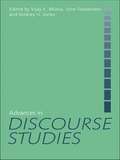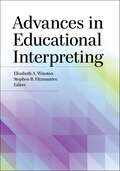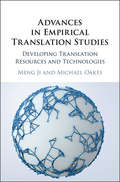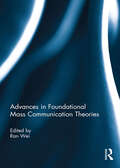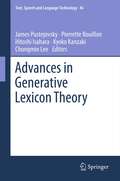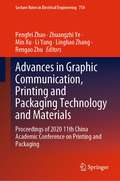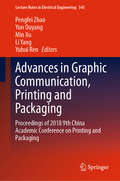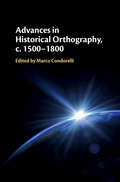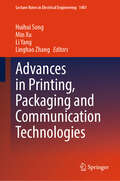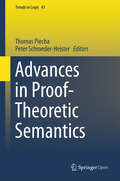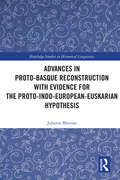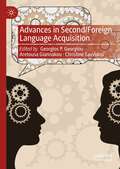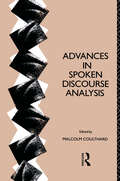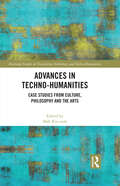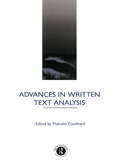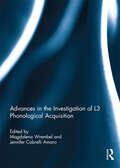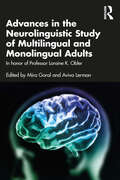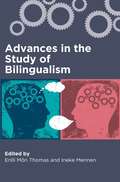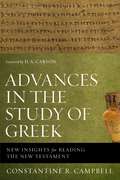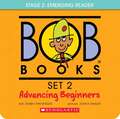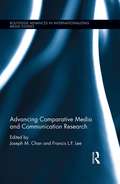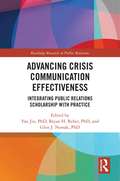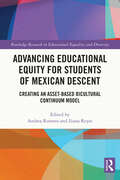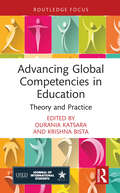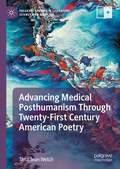- Table View
- List View
Advances in Discourse Studies
by Rodney H. Jones John Flowerdew Vijay K. BhatiaMethods of approaching the study of discourse have developed rapidly in the last ten years, influenced by a growing interdisciplinary spirit among linguistics and anthropology, sociology, cognitive and cultural psychology and cultural studies, as well as among established sub-fields within linguistics itself. Among the more recent developments are an increasing ‘critical’ turn in discourse analysis, a growing interest in historical, ethnographic and corpus-based approaches to discourse, more concern with the social contexts in which discourse occurs, the social actions that it is used to take and the identities that are constructed through it, as well as a revaluation of what counts as ‘discourse’ to include multi-modal texts and interaction. Advances in Discourse Studies brings together contributions from leading scholars in the field, investigating the historical and theoretical relationships between new advances in discourse studies and pointing towards new directions for the future of the discipline. Featuring discussion questions, classroom projects and recommended readings at the end of each section, as well as case studies illustrating each approach discussed, this is an invaluable resource for students of interdisciplinary discourse analysis.
Advances in Educational Interpreting
by Elizabeth A. Winston; Stephen B. FitzmauriceIn this follow up to Educational Interpreting: How It Can Succeed, published in 2004, Elizabeth A. Winston and Stephen B. Fitzmaurice present research about the current state of educational interpreting in both K-12 and post-secondary settings. This volume brings together experts in the field, including Deaf and hearing educational interpreters, interpreter researchers, interpreter educators, and Deaf consumers of educational interpreting services. The contributors explore impacts and potential outcomes for students placed in interpreted education settings, and address such topics as interpreter skills, cultural needs, and emergent signers. Winston and Fitzmaurice argue massive systemic paradigm shifts in interpreted educations are as needed now as they were when the first volume was published, and that these changes require the collaborative efforts of everyone on the educational team, including: administrators, general education teachers, teachers of the deaf, interpreters, and counselors. The contributors to this volume address research-based challenges and make recommendations for how interpreting practitioners, and all members of the educational team, can enact meaningful changes in their work towards becoming part of a more comprehensive solution to deaf education.
Advances in Empirical Translation Studies: Developing Translation Resources and Technologies
by Michael Oakes Meng JiEmpirical translation studies is a rapidly evolving research area. This volume, written by world-leading researchers, demonstrates the integration of two new research paradigms: socially-oriented and data driven approaches to empirical translation studies. These two models expand current translation studies and stimulate reader debates around how development of quantitative research methods and integration with advances in translation technologies would significantly increase the research capacities of translation studies. Highly engaging, the volume pioneers the development of socially-oriented innovative research methods to enhance the current research capacities of theoretical (descriptive) translation studies in order to tackle real-life research issues, such as environmental protection and multicultural health promotion. Illustrative case studies are used, bringing insight into advanced research methodologies of designing, developing and analysing large scale digital databases for multilingual and/or translation research.
Advances in Foundational Mass Communication Theories
by Ran WeiProviding leading-edge perspectives on the legacy theories of mass media and society, this collection advances the foundational theories of mass communications, which have sustained the field of study over the past fifty years. Many of these contributions were originally published as a Deutschmann Scholarly Essay in the Mass Communication and Society journal, and together they comprise a remarkable source of knowledge, equipped to lead mass communications theory through the emergence of new technologies, and the evolution of communications, in the 21st century.Moreover, the contributions gathered in this volume contradict any critics who may claim the theories of the 20th century have outlived their usefulness, for these prove to guide contemporary research as forcefully as ever in the digital era. Validating the classic media theories across time and their various forms constitute the second focal section of this volume. Finally, senior media scholars offer their views on the future directions in which mass communication theories can be advanced.
Advances in Generative Lexicon Theory (Text, Speech and Language Technology #46)
by James Pustejovsky Pierrette Bouillon Kyoko Kanzaki Chungmin Lee Hitoshi IsaharaThis collection of papers takes linguists to the leading edge of techniques in generative lexicon theory, the linguistic composition methodology that arose from the imperative to provide a compositional semantics for the contextual modifications in meaning that emerge in real linguistic usage. Today's growing shift towards distributed compositional analyses evinces the applicability of GL theory, and the contributions to this volume, presented at three international workshops (GL-2003, GL-2005 and GL-2007) address the relationship between compositionality in language and the mechanisms of selection in grammar that are necessary to maintain this property. The core unresolved issues in compositionality, relating to the interpretation of context and the mechanisms of selection, are treated from varying perspectives within GL theory, including its basic theoretical mechanisms and its analytical viewpoint on linguistic phenomena.
Advances in Graphic Communication, Printing and Packaging Technology and Materials: Proceedings of 2020 11th China Academic Conference on Printing and Packaging (Lecture Notes in Electrical Engineering #754)
by Min Xu Li Yang Pengfei Zhao Zhuangzhi Ye Linghao Zhang Rengao ZhuThis book includes a selection of reviewed papers presented at the 11th China Academic Conference on Printing and Packaging, held on November 26–29, 2020, Guangzhou, China. The conference is jointly organized by China Academy of Printing Technology and South China University of Technology. With 10 keynote talks and 200 presented papers on graphic communication and packaging technologies, the conference attracted more than 300 scientists.The proceedings cover the recent findings in color science and technology, image processing technology, digital media technology, mechanical and electronic engineering and numerical control, materials and detection, digital process management technology in printing and packaging, and other technologies. As such, the book is of interest to university researchers, R&D engineers and graduate students in the field of graphic arts, packaging, color science, image science, material science, computer science, digital media, network technology and smart manufacturing technology.
Advances in Graphic Communication, Printing and Packaging: Proceedings of 2018 9th China Academic Conference on Printing and Packaging (Lecture Notes in Electrical Engineering #543)
by Min Xu Li Yang Yun Ouyang Pengfei Zhao Yuhui RenThis book includes a selection of reviewed papers presented at the 9th China Academic Conference on Printing and Packaging, which was held in November 2018 in Shandong, China. The conference was jointly organized by the China Academy of Printing Technology and Qilu University of Technology (Shandong Academy of Sciences). With 8 keynote talks and over 200 presented papers on graphic communication and packaging technologies, the conference attracted more than 300 scientists.The proceedings cover the recent findings in color science and technology, image processing technology, digital media technology, mechanical engineering and numerical control, materials and detection, digital process management technology in printing and packaging, and other technologies. As such, the book is of interest to university researchers, R&D engineers and graduate students in the field of graphic arts, packaging, color science, image science, material science, computer science, digital media, and network technology.
Advances in Historical Orthography, c. 1500–1800
by Marco CondorelliThe early modern period is a key historical era for the standardisation of languages in Europe, in which orthographies played an important role. This book traces the development of European spelling systems in the early modern era, and is unique in bringing together several strands of historical research, across a diverse range of Germanic, Romance and Slavic languages, including Polish, German, French, Spanish, Lithuanian, Czech, Croatian and English. Whilst each chapter includes a case study on a particular language or script, the volume in general follows a broad thread of discussion based on models and methods relevant to many languages, showing how empirical approaches can be applied across languages to enrich the field of historical orthography as a whole. The first volume to diachronically explore the standardization of spelling systems from a cross-linguistic perspective, this is an invaluable resource for specialists and those interested in historical European studies more broadly.
Advances in Printing, Packaging and Communication Technologies (Lecture Notes in Electrical Engineering #1401)
by Min Xu Li Yang Linghao Zhang Huihui SongThis book includes original, peer-reviewed research papers from the 15th China Academic Conference on Printing and Packaging (CACPP 2024), held in Tianjin, China on November 14-16, 2024. The proceedings cover the latest findings in color science and technology, image processing technology, digital media technology, mechanical and electronic engineering and numerical control, materials and detection, printing and packaging technology, and so on. As such, the book is of interest to university researchers, R&D engineers and graduate students in the fields of color science, image science, materials science, computer science, digital media, network technology, smart manufacturing technology and printing and packaging.
Advances in Proof-Theoretic Semantics (Trends in Logic #43)
by Thomas Piecha Peter Schroeder-HeisterThis volume is the first ever collection devoted to the field of proof-theoretic semantics. Contributions address topics including the systematics of introduction and elimination rules and proofs of normalization, the categorial characterization of deductions, the relation between Heyting's and Gentzen's approaches to meaning, knowability paradoxes, proof-theoretic foundations of set theory, Dummett's justification of logical laws, Kreisel's theory of constructions, paradoxical reasoning, and the defence of model theory. The field of proof-theoretic semantics has existed for almost 50 years, but the term itself was proposed by Schroeder-Heister in the 1980s. Proof-theoretic semantics explains the meaning of linguistic expressions in general and of logical constants in particular in terms of the notion of proof. This volume emerges from presentations at the Second International Conference on Proof-Theoretic Semantics in Tübingen in 2013, where contributing authors were asked to provide a self-contained description and analysis of a significant research question in this area. The contributions are representative of the field and should be of interest to logicians, philosophers, and mathematicians alike.
Advances in Proto-Basque Reconstruction with Evidence for the Proto-Indo-European-Euskarian Hypothesis (Routledge Studies in Historical Linguistics)
by Juliette BlevinsThis book presents a new reconstruction of Proto-Basque, the mother language of modern Basque varieties, historical Basque, and Aquitanian, grounded in traditional methods of historical linguistics. Building on a long tradition of Basque scholarship, the comparative method and internal reconstruction, informed by the phonetic bases of sound change and phonological typology, are used to explain previously underappreciated alternations and asymmetries in Basque sound patterns, resulting in a radically new view of the proto-language. The comparative method is then used to compare this new Proto-Basque with Proto-Indo-European, revealing regular sound correspondences in basic vocabulary and grammatical formatives. Evaluation of these results supports a distant genetic relationship between Proto-Basque and Proto-Indo-European, and offers new insights into specific linguistic properties of these two ancient languages. This comprehensive volume, which includes a detailed appendix including Proto-Basque/Proto-Indo-European cognate sets, will be of general interest to linguists, archeologists, historians, and geneticists, and of particular interest to scholars in historical linguistics, phonetics and phonology, language change, and Basque and Indo-European studies.
Advances in Second/Foreign Language Acquisition
by Georgios P. Georgiou Aretousa Giannakou Christine SavvidouThis book includes studies that employ a variety of research techniques from diverse fields targeting a better understanding of the second language (L2)/foreign language (FL) acquisition process including issues of heritage language (HL) learning. Specifically, the chapters discuss matters such as speech perception and production patterns in a second/foreign language, factors that facilitate second language acquisition, acquisition of heritage languages, teaching of a second/foreign language, and acquisition of second/foreign language grammatical and other structures, among others. The investigation of L2/FL and HLs is of paramount importance for updating the existing theories in the field and maximizing learning outcomes for the sake of effective communication, cultivation of intercultural understanding, career advancement, and personal development. The book is of interest to a wide range of disciplinary audiences, including linguists, psychologists, educators, and social scientists.
Advances in Spoken Discourse Analysis
by Malcolm CoulthardThis collection reviews 20 years of research into Spoken Discourse by the Birmingham group, allowing, for the first time, a developmental perspective. It combines previously published but unavailable work with new research. Bringing together recent theories of discourse structure, with a new and detailed analytic framework, the book emphasises both historical context and new developments. The articles are comprehensive, ranging from the theoretical to the highly applied. Practical applications include language teaching, literary stylistics and forensic linguistics with examples taken from literature and language classrooms, telephone conversations, disputed witness statements and corpuses of spoken English.
Advances in Techno-Humanities: Case Studies from Culture, Philosophy and the Arts (Routledge Studies in Translation Technology and Techno-Humanities)
by Mak Kin-WahThis book is a pioneering attempt to explore the relationships between technology and the humanities through case studies and specific contexts in the areas of language, theatre, literature, translation, philosophy, music, home designations, learning environment, and artificial intelligence. Written by scholars and specialists across various fields, the chapters explore the emerging field of techno-humanities. This book examines the development of language and society by means of Big Data, how technology is integrated into the theatres of Hong Kong and the ensuing results of such integration. The authors also highlight how technology is able to analyse, understand, and visualise literary works and to bring drastic changes to translation in the past seven decades. Long-standing philosophical issues are re-examined, linkages between technology and theoretical concepts are illuminated, and the emotional aspects of computational applications are investigated. This book also delves into insightful case studies such as providing suggestions to train novice translators through corpus-assisted translation teaching, analysing patterns of housing names, and discovering a new online method to acknowledge acquisition through authentic learning experiences. Overall, this book serves as a point of departure for us to go deeper into the role of technology in transforming the humanities in this digital age. This is a useful read for students and scholars interested in learning more about the cross section between humanities and technology.
Advances in Written Text Analysis
by Malcolm CoulthardThis work provides an overview of a wide range of approaches to written text analysis. It includes both classic and specially commissioned papers by distinguished authors, which share a common linguistic framework. The pieces contain a variety of focuses from the patterning of paragraphs, sections or whole texts to the organization of clauses, individual expressions and single words, as well as a variety of text-types. The examples used range from pure science through social science, academic journals, weekly magazines and newspapers, to literary narratives. This collection forms the basis for an course on written text analysis that should be of interest to advanced undergraduate and postgraduate students.
Advances in the Investigation of L3 Phonological Acquisition
by Magdalena Wrembel and Jennifer Cabrelli AmaroThis book aims to bridge the gap in investigations into the acquisition of phonology from a multilingual perspective. In order to fully understand this process, the editors present state of the art research into third language (L3) phonology as well as future considerations for this field. The individual contributions address limitations apparent in current literature, in terms of methodology and scope, while offering innovative solutions in the study of conceptualization, design and data analysis, and novel application of theoretical frameworks to L3 phonology. The contributions consist of a number of original studies which attempt to address vital research questions regarding a bilingual advantage for subsequent phonological acquisition, the variables that drive phonological transfer at the onset of third language acquisition, the L3 developmental path, and how L3 phonological acquisition affects existing systems. The empirical and theoretical strides made in the study of L3 phonology, provided in this volume, confirm that it is a promising area of inquiry with a growing potential to provide novel insights into the linguistic and cognitive underpinnings of language acquisition. This book was originally published as a special issue of International Journal of Multilingualism.
Advances in the Neurolinguistic Study of Multilingual and Monolingual Adults: In honor of Professor Loraine K. Obler (Psychology Press Festschrift Series)
by Aviva LermanThis edited volume examines current themes in the neurolinguistic study of multilingual and monolingual adults and highlights several new directions the field is moving toward. The organization of the book is as follows. Part I focuses on language processing in multilingual and monolingual adults, Part II explores language processing in multilingual and monolingual adults with dementia, and Part III centers on language processing in multilingual and monolingual adults with stroke-induced aphasia. Chapters feature empirical data and/or literature reviews, discussing the key issues in the field that are currently engaging scholars and practitioners with topics including language attrition, cognitive flexibility, aging and the brain, eye-tracking studies of aphasia, translanguaging, and multilingualism in dementia. The book includes cuttingedge research from researchers and practitioners who are all alumni and colleagues of Professor Loraine K. Obler, to whom this book is dedicated. Presenting crucial topics in the field, the book is highly relevant for students, researchers, and practitioners in the fields of neurolinguistics, psycholinguistics, sociolinguistics, applied linguistics, and language disorders.
Advances in the Study of Bilingualism
by Ineke Mennen Enlli Môn ThomasThis book provides a contemporary approach to the study of bilingualism. Drawing on contributions from leading experts in the field, this book brings together - in a single volume - a selection of the exciting work conducted as part of the programme of the ESRC Centre for Research on Bilingualism in Theory and Practice at Bangor University, Wales. Each chapter has as its main focus an exploration of the relationship between the two languages of a bilingual. Section by section, the authors draw on current findings and methodologies to explore the ways in which their research can address this question from a number of different perspectives.
Advances in the Study of Greek: New Insights for Reading the New Testament
by D. A. Carson Constantine R. CampbellAdvances in the Study of Greek offers an introduction to issues of interest in the current world of Greek scholarship. Those within Greek scholarship will welcome this book as a tool that puts students, pastors, professors, and commentators firmly in touch with what is going on in Greek studies. Those outside Greek scholarship will warmly receive Advances in the Study of Greek as a resource to get themselves up to speed in Greek studies. Free of technical linguistic jargon, the scholarship contained within is highly accessible to outsiders.Advances in the Study of Greek provides an accessible introduction for students, pastors, professors, and commentators to understand the current issues of interest in this period of paradigm shift.
Advancing Beginners (Bob Books Set #2)
by Bobby Lynn Maslen John R. MaslenBob Books Set 2-Advancing Beginners continues to build reading skills. Use of three-letter words and consistent vowel sounds in slightly longer stories build confidence. Children love the hilarious (and sometimes mischievous) stories and pictures. These twelve books, filled with fun, drama, and surprise keep interest high for even the youngest readers.
Advancing Comparative Media and Communication Research (Routledge Advances in Internationalizing Media Studies)
by Joseph M. Chan Francis L. LeeA comparative approach to media and communication research plays an important, if not indispensable, role in achieving a core mission of researchers: to delimit the generality and specificity of media and communication theories, enabling researchers to more readily identify the influence of social, political and cultural contexts in shaping media and communication phenomena. To de-Westernize and internationalize media and communication studies has thus become the way forward for overcoming the parochialism of mainstream media and communication studies. This volume reflects on what comparative media and communication research has achieved or failed to achieve, the epistemological and theoretical challenges it is facing, and the new directions in which it should be heading.
Advancing Crisis Communication Effectiveness: Integrating Public Relations Scholarship with Practice (Routledge Research in Public Relations)
by Yan Jin PhD Bryan H. Reber PhD And G NowakAdvancing Crisis Communication Effectiveness shows how crisis communication plans and efforts for complex and challenging issues benefit when academic perspectives are connected with practitioner experiences. This book brings crisis and public relations scholars together with practicing professionals to integrate academic theories and research with the knowledge and lessons learned on the frontlines of crisis communication and management. This book illustrates how having insights and observations from both leading crisis communication scholars and professionals strengthens crisis management and communication strategies, plans, and coordination. Chapters co-authored by leading scholars and professionals highlight how academic theories and research can inform crisis management and response - and how practitioners can utilize, inform, and strengthen academic theories and research. For each topic area covered, examples and applications are provided that show how integrating public relations scholarship with practice can advance crisis communication effectiveness. This book represents a unique and timely contribution to the field of crisis management and communication. It will be an important resource for public relations and crisis management and communication scholars, educators, professionals, consultants, and graduate students.
Advancing Educational Equity for Students of Mexican Descent: Creating an Asset-based Bicultural Continuum Model (Routledge Research in Educational Equality and Diversity)
by Andrea Romero Iliana ReyesDrawing on participatory action research conducted with students, parents, families, and school staff in a Southwest community in the United States, this volume contests the interpretation of the achievement gap for students of Mexican descent in the American education system and highlights asset-based approaches that can facilitate students’ academic success. By presenting the Asset-Based Bicultural Continuum Model (ABC) and demonstrating the applications in a variety of family, school, and community-based initiatives, this volume demonstrates how community and cultural wealth can be harnessed to increase educational opportunities for Latino students. The ABC model offers new strategies which capitalize on the bicultural and linguistic assets rooted in local communities and offers place-based strategies driven by communities themselves in order to be tailored to students’ strengths. The text makes a significant contribution to understanding the social ecology of Latinx students’ experiences and offers a new direction for effective and evidence-based academic and health programs across the United States. This book will be a valuable resource for researchers and academics with an interest in the sociology of education, multicultural education, urban education, and bilingual education. It will be of particular interest to those with a focus on Hispanic and Latino studies.
Advancing Global Competencies in Education: Theory and Practice (Routledge Studies in Global Student Mobility)
by Krishna Bista Ourania KatsaraAdvancing Global Competencies in Education offers an in-depth and insightful exploration into the evolving field of international education and intercultural communication. This comprehensive volume brings together innovative practices, case studies, and diverse perspectives from prominent scholars and practitioners across the globe, making it an essential resource for the contemporary educational landscape. With a strong emphasis on diversity, inclusion, and the enhancement of intercultural competence, this collection offers both theoretical insights and practical strategies. It serves as a vital resource for educators, policymakers, and practitioners dedicated to promoting intercultural understanding and collaboration within educational settings.
Advancing Medical Posthumanism Through Twenty-First Century American Poetry (Palgrave Studies in Literature, Science and Medicine)
by Tana Jean WelchAdvancing Medical Posthumanism Through Twenty-First Century American Poetry places contemporary poetics in dialogue with posthumanism and biomedicine in order to create a framework for advancing a posthuman-affirmative ethics within the culture of medical practice. This book makes a case for a posthumanist understanding of the body—one that sees health and illness not as properties possessed by individual bodies, but as processes that connect bodies to their social and natural environment, shaping their capacity to act, think, and feel. Tana Jean Welch demonstrates how contemporary American poetry is specifically poised to develop a pathway toward a posthuman intervention in biomedicine, the field of medical humanities, medical discourse, and the value systems that guide U.S. healthcare in general.
